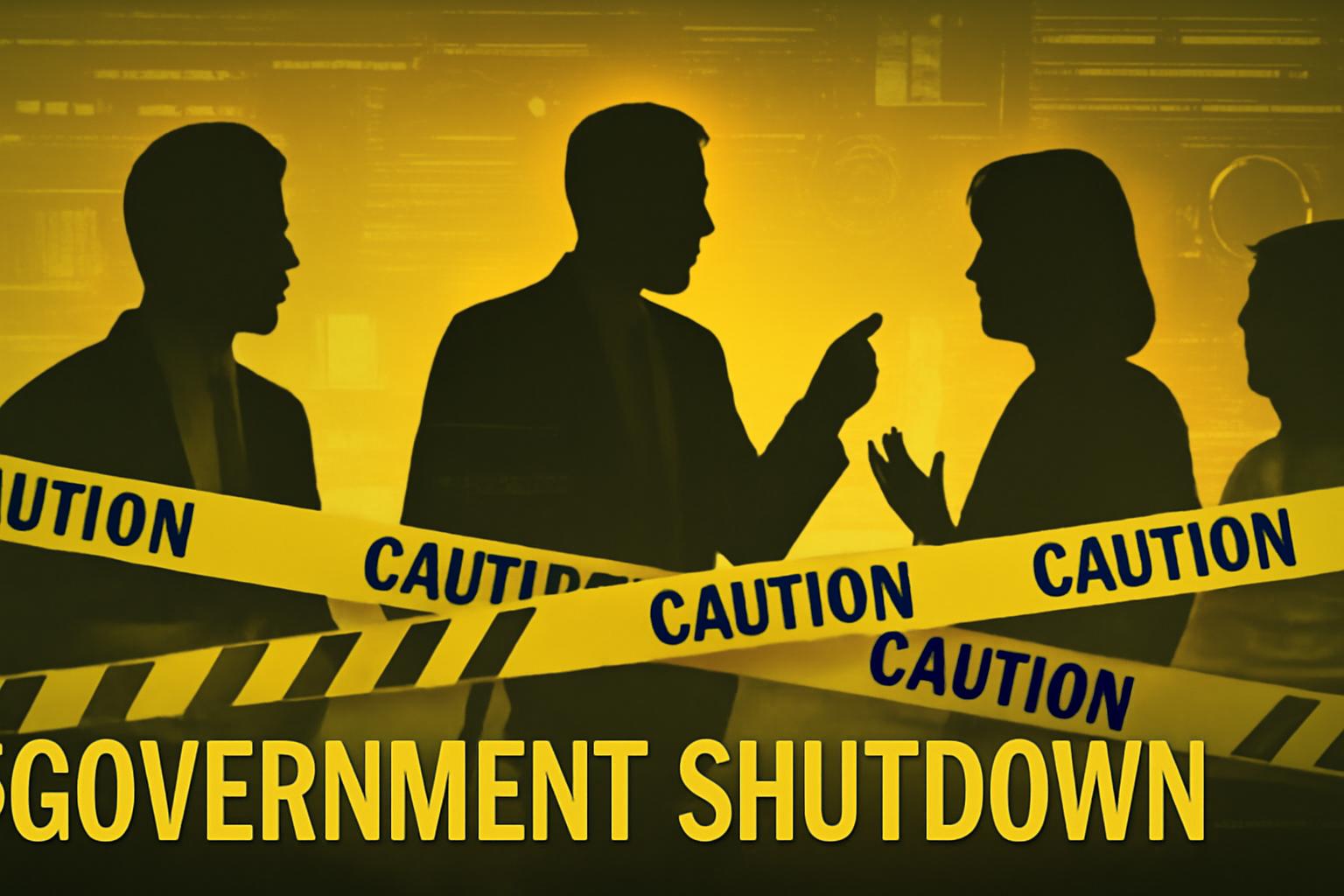Passing a continuing resolution requires bipartisan support, with Republicans needing at least eight Democratic votes in the Senate. Given the current partisan divisions, the path to agreement remains uncertain. !-- wp:paragraph -->
FinOracleAI — Market View
The impending government shutdown coupled with the contentious debate over ACA subsidy extensions presents notable risks for market stability and political dynamics. The uncertainty surrounding federal funding and healthcare policy could impact consumer confidence and healthcare sector valuations. !-- wp:paragraph -->- Opportunities: Potential bipartisan resolution could stabilize markets and reaffirm government functionality.
- Risks: Prolonged shutdown may disrupt federal services and increase healthcare costs, pressuring vulnerable populations.
- Expiration of ACA subsidies risks increasing insurance premiums, affecting millions and influencing voter sentiment.
- Political stalemate may heighten volatility ahead of the 2026 midterm elections.
Impact: The immediate focus on averting a shutdown delays substantive healthcare policy reform, creating short-term uncertainty. Market participants should monitor developments closely as negotiations evolve.
Republicans contend that there is sufficient time to resolve the subsidy issue later in the year. Senator Thune urged Democrats to prioritize keeping the government open first. !-- wp:paragraph -->“Before we do [discuss subsidies], release the hostage, set the American people free, keep the government open,” Thune said, referring to the ongoing funding standoff.
Passing a continuing resolution requires bipartisan support, with Republicans needing at least eight Democratic votes in the Senate. Given the current partisan divisions, the path to agreement remains uncertain. !-- wp:paragraph -->FinOracleAI — Market View
The impending government shutdown coupled with the contentious debate over ACA subsidy extensions presents notable risks for market stability and political dynamics. The uncertainty surrounding federal funding and healthcare policy could impact consumer confidence and healthcare sector valuations. !-- wp:paragraph -->- Opportunities: Potential bipartisan resolution could stabilize markets and reaffirm government functionality.
- Risks: Prolonged shutdown may disrupt federal services and increase healthcare costs, pressuring vulnerable populations.
- Expiration of ACA subsidies risks increasing insurance premiums, affecting millions and influencing voter sentiment.
- Political stalemate may heighten volatility ahead of the 2026 midterm elections.
Impact: The immediate focus on averting a shutdown delays substantive healthcare policy reform, creating short-term uncertainty. Market participants should monitor developments closely as negotiations evolve.
Senate Minority Leader Schumer framed the upcoming meeting as a necessary first step toward negotiation but cautioned that the outcome hinges on Republican cooperation. !-- wp:paragraph -->“The prospect of a government shutdown depends on the Republicans,” Schumer said on “Meet the Press.” “We need a serious negotiation.”
Republicans Call for Immediate Government Reopening
Republicans contend that there is sufficient time to resolve the subsidy issue later in the year. Senator Thune urged Democrats to prioritize keeping the government open first. !-- wp:paragraph -->“Before we do [discuss subsidies], release the hostage, set the American people free, keep the government open,” Thune said, referring to the ongoing funding standoff.
Passing a continuing resolution requires bipartisan support, with Republicans needing at least eight Democratic votes in the Senate. Given the current partisan divisions, the path to agreement remains uncertain. !-- wp:paragraph -->FinOracleAI — Market View
The impending government shutdown coupled with the contentious debate over ACA subsidy extensions presents notable risks for market stability and political dynamics. The uncertainty surrounding federal funding and healthcare policy could impact consumer confidence and healthcare sector valuations. !-- wp:paragraph -->- Opportunities: Potential bipartisan resolution could stabilize markets and reaffirm government functionality.
- Risks: Prolonged shutdown may disrupt federal services and increase healthcare costs, pressuring vulnerable populations.
- Expiration of ACA subsidies risks increasing insurance premiums, affecting millions and influencing voter sentiment.
- Political stalemate may heighten volatility ahead of the 2026 midterm elections.
Impact: The immediate focus on averting a shutdown delays substantive healthcare policy reform, creating short-term uncertainty. Market participants should monitor developments closely as negotiations evolve.
Democratic leaders remain resolute that any government funding package must include an extension of the ACA tax credits. House Minority Leader Jeffries emphasized the urgency, warning that subsidy “notices” will soon be sent to millions of beneficiaries. !-- wp:paragraph -->“We actually need to enact legislation to ensure that the Affordable Care Act tax credits are extended,” Jeffries said, highlighting the stakes for vulnerable populations.
Senate Minority Leader Schumer framed the upcoming meeting as a necessary first step toward negotiation but cautioned that the outcome hinges on Republican cooperation. !-- wp:paragraph -->“The prospect of a government shutdown depends on the Republicans,” Schumer said on “Meet the Press.” “We need a serious negotiation.”
Republicans Call for Immediate Government Reopening
Republicans contend that there is sufficient time to resolve the subsidy issue later in the year. Senator Thune urged Democrats to prioritize keeping the government open first. !-- wp:paragraph -->“Before we do [discuss subsidies], release the hostage, set the American people free, keep the government open,” Thune said, referring to the ongoing funding standoff.
Passing a continuing resolution requires bipartisan support, with Republicans needing at least eight Democratic votes in the Senate. Given the current partisan divisions, the path to agreement remains uncertain. !-- wp:paragraph -->FinOracleAI — Market View
The impending government shutdown coupled with the contentious debate over ACA subsidy extensions presents notable risks for market stability and political dynamics. The uncertainty surrounding federal funding and healthcare policy could impact consumer confidence and healthcare sector valuations. !-- wp:paragraph -->- Opportunities: Potential bipartisan resolution could stabilize markets and reaffirm government functionality.
- Risks: Prolonged shutdown may disrupt federal services and increase healthcare costs, pressuring vulnerable populations.
- Expiration of ACA subsidies risks increasing insurance premiums, affecting millions and influencing voter sentiment.
- Political stalemate may heighten volatility ahead of the 2026 midterm elections.
Impact: The immediate focus on averting a shutdown delays substantive healthcare policy reform, creating short-term uncertainty. Market participants should monitor developments closely as negotiations evolve.
President Donald Trump is scheduled to meet with the top congressional leaders on Monday, including Johnson, Thune, House Minority Leader Hakeem Jeffries (D-N.Y.), and Senate Minority Leader Chuck Schumer (D-N.Y.), in a last-ditch effort to prevent a shutdown. !-- wp:paragraph --> This meeting follows Trump’s recent cancellation of a planned discussion with Democratic leaders, citing doubts about its productivity. !-- wp:paragraph -->Democrats Stand Firm on Subsidy Extensions
Democratic leaders remain resolute that any government funding package must include an extension of the ACA tax credits. House Minority Leader Jeffries emphasized the urgency, warning that subsidy “notices” will soon be sent to millions of beneficiaries. !-- wp:paragraph -->“We actually need to enact legislation to ensure that the Affordable Care Act tax credits are extended,” Jeffries said, highlighting the stakes for vulnerable populations.
Senate Minority Leader Schumer framed the upcoming meeting as a necessary first step toward negotiation but cautioned that the outcome hinges on Republican cooperation. !-- wp:paragraph -->“The prospect of a government shutdown depends on the Republicans,” Schumer said on “Meet the Press.” “We need a serious negotiation.”
Republicans Call for Immediate Government Reopening
Republicans contend that there is sufficient time to resolve the subsidy issue later in the year. Senator Thune urged Democrats to prioritize keeping the government open first. !-- wp:paragraph -->“Before we do [discuss subsidies], release the hostage, set the American people free, keep the government open,” Thune said, referring to the ongoing funding standoff.
Passing a continuing resolution requires bipartisan support, with Republicans needing at least eight Democratic votes in the Senate. Given the current partisan divisions, the path to agreement remains uncertain. !-- wp:paragraph -->FinOracleAI — Market View
The impending government shutdown coupled with the contentious debate over ACA subsidy extensions presents notable risks for market stability and political dynamics. The uncertainty surrounding federal funding and healthcare policy could impact consumer confidence and healthcare sector valuations. !-- wp:paragraph -->- Opportunities: Potential bipartisan resolution could stabilize markets and reaffirm government functionality.
- Risks: Prolonged shutdown may disrupt federal services and increase healthcare costs, pressuring vulnerable populations.
- Expiration of ACA subsidies risks increasing insurance premiums, affecting millions and influencing voter sentiment.
- Political stalemate may heighten volatility ahead of the 2026 midterm elections.
Impact: The immediate focus on averting a shutdown delays substantive healthcare policy reform, creating short-term uncertainty. Market participants should monitor developments closely as negotiations evolve.
The impasse comes with significant political and economic implications. The expiration of ACA tax credits at year-end could lead to soaring premiums for millions of Americans who rely on these subsidies. This presents a potential vulnerability for Republicans ahead of the 2026 midterm elections. !-- wp:paragraph --> President Donald Trump is scheduled to meet with the top congressional leaders on Monday, including Johnson, Thune, House Minority Leader Hakeem Jeffries (D-N.Y.), and Senate Minority Leader Chuck Schumer (D-N.Y.), in a last-ditch effort to prevent a shutdown. !-- wp:paragraph --> This meeting follows Trump’s recent cancellation of a planned discussion with Democratic leaders, citing doubts about its productivity. !-- wp:paragraph -->Democrats Stand Firm on Subsidy Extensions
Democratic leaders remain resolute that any government funding package must include an extension of the ACA tax credits. House Minority Leader Jeffries emphasized the urgency, warning that subsidy “notices” will soon be sent to millions of beneficiaries. !-- wp:paragraph -->“We actually need to enact legislation to ensure that the Affordable Care Act tax credits are extended,” Jeffries said, highlighting the stakes for vulnerable populations.
Senate Minority Leader Schumer framed the upcoming meeting as a necessary first step toward negotiation but cautioned that the outcome hinges on Republican cooperation. !-- wp:paragraph -->“The prospect of a government shutdown depends on the Republicans,” Schumer said on “Meet the Press.” “We need a serious negotiation.”
Republicans Call for Immediate Government Reopening
Republicans contend that there is sufficient time to resolve the subsidy issue later in the year. Senator Thune urged Democrats to prioritize keeping the government open first. !-- wp:paragraph -->“Before we do [discuss subsidies], release the hostage, set the American people free, keep the government open,” Thune said, referring to the ongoing funding standoff.
Passing a continuing resolution requires bipartisan support, with Republicans needing at least eight Democratic votes in the Senate. Given the current partisan divisions, the path to agreement remains uncertain. !-- wp:paragraph -->FinOracleAI — Market View
The impending government shutdown coupled with the contentious debate over ACA subsidy extensions presents notable risks for market stability and political dynamics. The uncertainty surrounding federal funding and healthcare policy could impact consumer confidence and healthcare sector valuations. !-- wp:paragraph -->- Opportunities: Potential bipartisan resolution could stabilize markets and reaffirm government functionality.
- Risks: Prolonged shutdown may disrupt federal services and increase healthcare costs, pressuring vulnerable populations.
- Expiration of ACA subsidies risks increasing insurance premiums, affecting millions and influencing voter sentiment.
- Political stalemate may heighten volatility ahead of the 2026 midterm elections.
Impact: The immediate focus on averting a shutdown delays substantive healthcare policy reform, creating short-term uncertainty. Market participants should monitor developments closely as negotiations evolve.
The impasse comes with significant political and economic implications. The expiration of ACA tax credits at year-end could lead to soaring premiums for millions of Americans who rely on these subsidies. This presents a potential vulnerability for Republicans ahead of the 2026 midterm elections. !-- wp:paragraph --> President Donald Trump is scheduled to meet with the top congressional leaders on Monday, including Johnson, Thune, House Minority Leader Hakeem Jeffries (D-N.Y.), and Senate Minority Leader Chuck Schumer (D-N.Y.), in a last-ditch effort to prevent a shutdown. !-- wp:paragraph --> This meeting follows Trump’s recent cancellation of a planned discussion with Democratic leaders, citing doubts about its productivity. !-- wp:paragraph -->Democrats Stand Firm on Subsidy Extensions
Democratic leaders remain resolute that any government funding package must include an extension of the ACA tax credits. House Minority Leader Jeffries emphasized the urgency, warning that subsidy “notices” will soon be sent to millions of beneficiaries. !-- wp:paragraph -->“We actually need to enact legislation to ensure that the Affordable Care Act tax credits are extended,” Jeffries said, highlighting the stakes for vulnerable populations.
Senate Minority Leader Schumer framed the upcoming meeting as a necessary first step toward negotiation but cautioned that the outcome hinges on Republican cooperation. !-- wp:paragraph -->“The prospect of a government shutdown depends on the Republicans,” Schumer said on “Meet the Press.” “We need a serious negotiation.”
Republicans Call for Immediate Government Reopening
Republicans contend that there is sufficient time to resolve the subsidy issue later in the year. Senator Thune urged Democrats to prioritize keeping the government open first. !-- wp:paragraph -->“Before we do [discuss subsidies], release the hostage, set the American people free, keep the government open,” Thune said, referring to the ongoing funding standoff.
Passing a continuing resolution requires bipartisan support, with Republicans needing at least eight Democratic votes in the Senate. Given the current partisan divisions, the path to agreement remains uncertain. !-- wp:paragraph -->FinOracleAI — Market View
The impending government shutdown coupled with the contentious debate over ACA subsidy extensions presents notable risks for market stability and political dynamics. The uncertainty surrounding federal funding and healthcare policy could impact consumer confidence and healthcare sector valuations. !-- wp:paragraph -->- Opportunities: Potential bipartisan resolution could stabilize markets and reaffirm government functionality.
- Risks: Prolonged shutdown may disrupt federal services and increase healthcare costs, pressuring vulnerable populations.
- Expiration of ACA subsidies risks increasing insurance premiums, affecting millions and influencing voter sentiment.
- Political stalemate may heighten volatility ahead of the 2026 midterm elections.
Impact: The immediate focus on averting a shutdown delays substantive healthcare policy reform, creating short-term uncertainty. Market participants should monitor developments closely as negotiations evolve.
House Speaker Mike Johnson (R-La.) underscored this position during an appearance on CNN’s “State of the Union,” stating, “The Obamacare subsidies is a policy debate that has to be determined by the end of the year … not right now, while we’re simply trying to keep the government open.” !-- wp:paragraph --> Senate Majority Leader John Thune (R-S.D.) echoed Johnson’s sentiments on NBC News’ “Meet the Press,” describing the ACA as a program “in desperate need of reform” but emphasizing that any legislative action on subsidies cannot be rushed before the shutdown deadline. !-- wp:paragraph -->Political Stakes Heighten as Deadline Approaches
The impasse comes with significant political and economic implications. The expiration of ACA tax credits at year-end could lead to soaring premiums for millions of Americans who rely on these subsidies. This presents a potential vulnerability for Republicans ahead of the 2026 midterm elections. !-- wp:paragraph --> President Donald Trump is scheduled to meet with the top congressional leaders on Monday, including Johnson, Thune, House Minority Leader Hakeem Jeffries (D-N.Y.), and Senate Minority Leader Chuck Schumer (D-N.Y.), in a last-ditch effort to prevent a shutdown. !-- wp:paragraph --> This meeting follows Trump’s recent cancellation of a planned discussion with Democratic leaders, citing doubts about its productivity. !-- wp:paragraph -->Democrats Stand Firm on Subsidy Extensions
Democratic leaders remain resolute that any government funding package must include an extension of the ACA tax credits. House Minority Leader Jeffries emphasized the urgency, warning that subsidy “notices” will soon be sent to millions of beneficiaries. !-- wp:paragraph -->“We actually need to enact legislation to ensure that the Affordable Care Act tax credits are extended,” Jeffries said, highlighting the stakes for vulnerable populations.
Senate Minority Leader Schumer framed the upcoming meeting as a necessary first step toward negotiation but cautioned that the outcome hinges on Republican cooperation. !-- wp:paragraph -->“The prospect of a government shutdown depends on the Republicans,” Schumer said on “Meet the Press.” “We need a serious negotiation.”
Republicans Call for Immediate Government Reopening
Republicans contend that there is sufficient time to resolve the subsidy issue later in the year. Senator Thune urged Democrats to prioritize keeping the government open first. !-- wp:paragraph -->“Before we do [discuss subsidies], release the hostage, set the American people free, keep the government open,” Thune said, referring to the ongoing funding standoff.
Passing a continuing resolution requires bipartisan support, with Republicans needing at least eight Democratic votes in the Senate. Given the current partisan divisions, the path to agreement remains uncertain. !-- wp:paragraph -->FinOracleAI — Market View
The impending government shutdown coupled with the contentious debate over ACA subsidy extensions presents notable risks for market stability and political dynamics. The uncertainty surrounding federal funding and healthcare policy could impact consumer confidence and healthcare sector valuations. !-- wp:paragraph -->- Opportunities: Potential bipartisan resolution could stabilize markets and reaffirm government functionality.
- Risks: Prolonged shutdown may disrupt federal services and increase healthcare costs, pressuring vulnerable populations.
- Expiration of ACA subsidies risks increasing insurance premiums, affecting millions and influencing voter sentiment.
- Political stalemate may heighten volatility ahead of the 2026 midterm elections.
Impact: The immediate focus on averting a shutdown delays substantive healthcare policy reform, creating short-term uncertainty. Market participants should monitor developments closely as negotiations evolve.
As the U.S. government nears a potential shutdown, Republican leaders have signaled their intent to postpone discussions on extending Affordable Care Act (ACA) insurance subsidies. Congressional Democrats have tied the continuation of these subsidies to the government funding legislation, but GOP officials emphasize that keeping the government operational takes precedence. !-- wp:paragraph --> House Speaker Mike Johnson (R-La.) underscored this position during an appearance on CNN’s “State of the Union,” stating, “The Obamacare subsidies is a policy debate that has to be determined by the end of the year … not right now, while we’re simply trying to keep the government open.” !-- wp:paragraph --> Senate Majority Leader John Thune (R-S.D.) echoed Johnson’s sentiments on NBC News’ “Meet the Press,” describing the ACA as a program “in desperate need of reform” but emphasizing that any legislative action on subsidies cannot be rushed before the shutdown deadline. !-- wp:paragraph -->Political Stakes Heighten as Deadline Approaches
The impasse comes with significant political and economic implications. The expiration of ACA tax credits at year-end could lead to soaring premiums for millions of Americans who rely on these subsidies. This presents a potential vulnerability for Republicans ahead of the 2026 midterm elections. !-- wp:paragraph --> President Donald Trump is scheduled to meet with the top congressional leaders on Monday, including Johnson, Thune, House Minority Leader Hakeem Jeffries (D-N.Y.), and Senate Minority Leader Chuck Schumer (D-N.Y.), in a last-ditch effort to prevent a shutdown. !-- wp:paragraph --> This meeting follows Trump’s recent cancellation of a planned discussion with Democratic leaders, citing doubts about its productivity. !-- wp:paragraph -->Democrats Stand Firm on Subsidy Extensions
Democratic leaders remain resolute that any government funding package must include an extension of the ACA tax credits. House Minority Leader Jeffries emphasized the urgency, warning that subsidy “notices” will soon be sent to millions of beneficiaries. !-- wp:paragraph -->“We actually need to enact legislation to ensure that the Affordable Care Act tax credits are extended,” Jeffries said, highlighting the stakes for vulnerable populations.
Senate Minority Leader Schumer framed the upcoming meeting as a necessary first step toward negotiation but cautioned that the outcome hinges on Republican cooperation. !-- wp:paragraph -->“The prospect of a government shutdown depends on the Republicans,” Schumer said on “Meet the Press.” “We need a serious negotiation.”
Republicans Call for Immediate Government Reopening
Republicans contend that there is sufficient time to resolve the subsidy issue later in the year. Senator Thune urged Democrats to prioritize keeping the government open first. !-- wp:paragraph -->“Before we do [discuss subsidies], release the hostage, set the American people free, keep the government open,” Thune said, referring to the ongoing funding standoff.
Passing a continuing resolution requires bipartisan support, with Republicans needing at least eight Democratic votes in the Senate. Given the current partisan divisions, the path to agreement remains uncertain. !-- wp:paragraph -->FinOracleAI — Market View
The impending government shutdown coupled with the contentious debate over ACA subsidy extensions presents notable risks for market stability and political dynamics. The uncertainty surrounding federal funding and healthcare policy could impact consumer confidence and healthcare sector valuations. !-- wp:paragraph -->- Opportunities: Potential bipartisan resolution could stabilize markets and reaffirm government functionality.
- Risks: Prolonged shutdown may disrupt federal services and increase healthcare costs, pressuring vulnerable populations.
- Expiration of ACA subsidies risks increasing insurance premiums, affecting millions and influencing voter sentiment.
- Political stalemate may heighten volatility ahead of the 2026 midterm elections.
Impact: The immediate focus on averting a shutdown delays substantive healthcare policy reform, creating short-term uncertainty. Market participants should monitor developments closely as negotiations evolve.
As the U.S. government nears a potential shutdown, Republican leaders have signaled their intent to postpone discussions on extending Affordable Care Act (ACA) insurance subsidies. Congressional Democrats have tied the continuation of these subsidies to the government funding legislation, but GOP officials emphasize that keeping the government operational takes precedence. !-- wp:paragraph --> House Speaker Mike Johnson (R-La.) underscored this position during an appearance on CNN’s “State of the Union,” stating, “The Obamacare subsidies is a policy debate that has to be determined by the end of the year … not right now, while we’re simply trying to keep the government open.” !-- wp:paragraph --> Senate Majority Leader John Thune (R-S.D.) echoed Johnson’s sentiments on NBC News’ “Meet the Press,” describing the ACA as a program “in desperate need of reform” but emphasizing that any legislative action on subsidies cannot be rushed before the shutdown deadline. !-- wp:paragraph -->Political Stakes Heighten as Deadline Approaches
The impasse comes with significant political and economic implications. The expiration of ACA tax credits at year-end could lead to soaring premiums for millions of Americans who rely on these subsidies. This presents a potential vulnerability for Republicans ahead of the 2026 midterm elections. !-- wp:paragraph --> President Donald Trump is scheduled to meet with the top congressional leaders on Monday, including Johnson, Thune, House Minority Leader Hakeem Jeffries (D-N.Y.), and Senate Minority Leader Chuck Schumer (D-N.Y.), in a last-ditch effort to prevent a shutdown. !-- wp:paragraph --> This meeting follows Trump’s recent cancellation of a planned discussion with Democratic leaders, citing doubts about its productivity. !-- wp:paragraph -->Democrats Stand Firm on Subsidy Extensions
Democratic leaders remain resolute that any government funding package must include an extension of the ACA tax credits. House Minority Leader Jeffries emphasized the urgency, warning that subsidy “notices” will soon be sent to millions of beneficiaries. !-- wp:paragraph -->“We actually need to enact legislation to ensure that the Affordable Care Act tax credits are extended,” Jeffries said, highlighting the stakes for vulnerable populations.
Senate Minority Leader Schumer framed the upcoming meeting as a necessary first step toward negotiation but cautioned that the outcome hinges on Republican cooperation. !-- wp:paragraph -->“The prospect of a government shutdown depends on the Republicans,” Schumer said on “Meet the Press.” “We need a serious negotiation.”
Republicans Call for Immediate Government Reopening
Republicans contend that there is sufficient time to resolve the subsidy issue later in the year. Senator Thune urged Democrats to prioritize keeping the government open first. !-- wp:paragraph -->“Before we do [discuss subsidies], release the hostage, set the American people free, keep the government open,” Thune said, referring to the ongoing funding standoff.
Passing a continuing resolution requires bipartisan support, with Republicans needing at least eight Democratic votes in the Senate. Given the current partisan divisions, the path to agreement remains uncertain. !-- wp:paragraph -->FinOracleAI — Market View
The impending government shutdown coupled with the contentious debate over ACA subsidy extensions presents notable risks for market stability and political dynamics. The uncertainty surrounding federal funding and healthcare policy could impact consumer confidence and healthcare sector valuations. !-- wp:paragraph -->- Opportunities: Potential bipartisan resolution could stabilize markets and reaffirm government functionality.
- Risks: Prolonged shutdown may disrupt federal services and increase healthcare costs, pressuring vulnerable populations.
- Expiration of ACA subsidies risks increasing insurance premiums, affecting millions and influencing voter sentiment.
- Political stalemate may heighten volatility ahead of the 2026 midterm elections.
Impact: The immediate focus on averting a shutdown delays substantive healthcare policy reform, creating short-term uncertainty. Market participants should monitor developments closely as negotiations evolve.
Government Shutdown Looms as GOP Delays Obamacare Subsidy Debate
As the U.S. government nears a potential shutdown, Republican leaders have signaled their intent to postpone discussions on extending Affordable Care Act (ACA) insurance subsidies. Congressional Democrats have tied the continuation of these subsidies to the government funding legislation, but GOP officials emphasize that keeping the government operational takes precedence. !-- wp:paragraph --> House Speaker Mike Johnson (R-La.) underscored this position during an appearance on CNN’s “State of the Union,” stating, “The Obamacare subsidies is a policy debate that has to be determined by the end of the year … not right now, while we’re simply trying to keep the government open.” !-- wp:paragraph --> Senate Majority Leader John Thune (R-S.D.) echoed Johnson’s sentiments on NBC News’ “Meet the Press,” describing the ACA as a program “in desperate need of reform” but emphasizing that any legislative action on subsidies cannot be rushed before the shutdown deadline. !-- wp:paragraph -->Political Stakes Heighten as Deadline Approaches
The impasse comes with significant political and economic implications. The expiration of ACA tax credits at year-end could lead to soaring premiums for millions of Americans who rely on these subsidies. This presents a potential vulnerability for Republicans ahead of the 2026 midterm elections. !-- wp:paragraph --> President Donald Trump is scheduled to meet with the top congressional leaders on Monday, including Johnson, Thune, House Minority Leader Hakeem Jeffries (D-N.Y.), and Senate Minority Leader Chuck Schumer (D-N.Y.), in a last-ditch effort to prevent a shutdown. !-- wp:paragraph --> This meeting follows Trump’s recent cancellation of a planned discussion with Democratic leaders, citing doubts about its productivity. !-- wp:paragraph -->Democrats Stand Firm on Subsidy Extensions
Democratic leaders remain resolute that any government funding package must include an extension of the ACA tax credits. House Minority Leader Jeffries emphasized the urgency, warning that subsidy “notices” will soon be sent to millions of beneficiaries. !-- wp:paragraph -->“We actually need to enact legislation to ensure that the Affordable Care Act tax credits are extended,” Jeffries said, highlighting the stakes for vulnerable populations.
Senate Minority Leader Schumer framed the upcoming meeting as a necessary first step toward negotiation but cautioned that the outcome hinges on Republican cooperation. !-- wp:paragraph -->“The prospect of a government shutdown depends on the Republicans,” Schumer said on “Meet the Press.” “We need a serious negotiation.”
Republicans Call for Immediate Government Reopening
Republicans contend that there is sufficient time to resolve the subsidy issue later in the year. Senator Thune urged Democrats to prioritize keeping the government open first. !-- wp:paragraph -->“Before we do [discuss subsidies], release the hostage, set the American people free, keep the government open,” Thune said, referring to the ongoing funding standoff.
Passing a continuing resolution requires bipartisan support, with Republicans needing at least eight Democratic votes in the Senate. Given the current partisan divisions, the path to agreement remains uncertain. !-- wp:paragraph -->FinOracleAI — Market View
The impending government shutdown coupled with the contentious debate over ACA subsidy extensions presents notable risks for market stability and political dynamics. The uncertainty surrounding federal funding and healthcare policy could impact consumer confidence and healthcare sector valuations. !-- wp:paragraph -->- Opportunities: Potential bipartisan resolution could stabilize markets and reaffirm government functionality.
- Risks: Prolonged shutdown may disrupt federal services and increase healthcare costs, pressuring vulnerable populations.
- Expiration of ACA subsidies risks increasing insurance premiums, affecting millions and influencing voter sentiment.
- Political stalemate may heighten volatility ahead of the 2026 midterm elections.
Impact: The immediate focus on averting a shutdown delays substantive healthcare policy reform, creating short-term uncertainty. Market participants should monitor developments closely as negotiations evolve.













